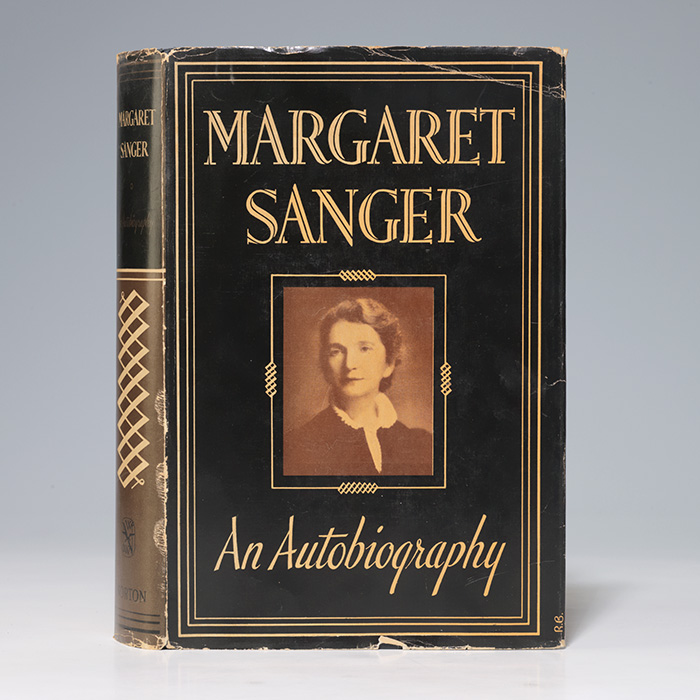
"A BASIC HUMAN RIGHT": PRESENTATION/ASSOCIATION FIRST EDITION OF MARGARET SANGER'S AUTOBIOGRAPHY, 1938, WARMLY INSCRIBED BY HER
SANGER, Margaret. An Autobiography. New York: W.W. Norton, (1938). Octavo, original navy cloth, original dust jacket. $1800.
First edition of the Autobiography of Margaret Sanger, who spearheaded the movement for contraceptive rights, a memorable presentation/association copy inscribed by her, "To Dr. Maurice William, My friend and Coworker in many causes, Margaret Sanger Aug 27/45."
"As the originator of the phrase 'birth control' and its best-known advocate, Margaret Sanger survived Federal indictments, a brief jail term, numerous lawsuits, hundreds of street-corner rallies and raids on her clinics to see much of the world accept her view that family planning is a basic human right." In 1936 her efforts influenced the reinterpretation of the Comstock law "to provide for distribution of contraceptive information" (New York Times). Praised by Pearl Buck as "one of the most courageous women of our times," Sanger vigorously challenged "old sexual values; she ended her career, heavy with honors, as the respected champion of new ones. Her life spanned a period of striking changes in American attitudes about the family, the role of woman, and sexual standards. All of those changes she helped to catalyze" (ANB). Sanger founded and served as president of the American Birth Control League, organized the first World Population Conference in Geneva, and was the first president of the International Planned Parenthood Federation. With frontispiece portrait of Sanger. "First Edition" stated on copyright page. A colleague of Sanger's, Dr. Maurice William understood the struggles of New York's poor and their need for access to reliable clinics and physicians. This prompted him to be "instrumental in getting New York to adopt legislation guaranteeing ethical standards in dentistry" (Maurice William Archive, UCLA). After he self-published his Social Interpretation of History (1920), he "increasingly turned his attention to improving the health of society as a whole" (Wetherby, Private Aid, 43). In the 1930s Dr. William became the first secretary and a founding member of the board of directors for the American Bureau of Medical Aid. He was also a chairman of a key committee of the United Council for Civilian Relief in China, whose members included Einstein and President Hoover.
Text fresh, marginal dampstaining to early leaves and corner of front board; light edge-wear, small chip to upper rear edge of scarce dust jacket. A near-fine inscribed copy.